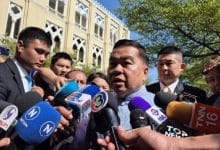No boots for blisters: Thai military service exemptions updated

In a move that’s shaking up the conscription rules, Thailand’s Defence Ministry added three more medical conditions to the list of diseases that exempt young men from compulsory military service — and they’re anything but ordinary.
A directive signed by Defence Minister Phumtham Wechayachai and Interior Minister Anutin Charnvirakul was published in the Royal Gazette on March 25 and took effect immediately.
The ruling invokes Article 28 (2) of the Military Service Act 1954 to revise Coup Order No. 300 (1972), officially expanding the list of disqualifying medical conditions from 12 to 15.
The three newly added diseases are:
-
A group of blistering skin diseases
-
Hirschsprung’s disease
-
Glucose-6-Phosphate Dehydrogenase (G6PD) deficiency
The blistering disease group includes rare and serious autoimmune skin conditions such as Pemphigus vulgaris, Pemphigus foliaceus, Pemphigus erythematosus, Paraneoplastic pemphigus, Gestational pemphigoid, and Epidermolysis bullosa.
These conditions cause painful blisters and skin damage, often requiring long-term treatment and specialised care, making military life not just uncomfortable but dangerous.
Hirschsprung’s disease, typically diagnosed at birth or in early childhood, affects the colon due to missing nerve cells. This leads to chronic bowel obstruction and can cause life-threatening complications if untreated.
G6PD deficiency, on the other hand, is a genetic disorder affecting red blood cells. The lack of this essential enzyme can lead to hemolysis (the breakdown of red blood cells), especially when exposed to certain foods, medications, or infections — conditions that could easily arise in the demanding environment of military training.

These three join the previously listed 12 groups of conditions that already qualified for exemption, such as asthma, coronary artery disease, mental health disorders, cancer, hepatitis, albinism, and gender identity-related conditions, reported The Nation.
The latest update reflects what many see as a long-overdue adjustment in military medical screening standards, particularly as understanding of rare diseases and genetic conditions improves.
While conscription remains a rite of passage for many Thai men, the Defence Ministry’s decision signals growing awareness of health equity and an attempt to ensure that the system doesn’t come at the cost of an individual’s well-being.
Latest Thailand News
Follow The Thaiger on Google News:


























